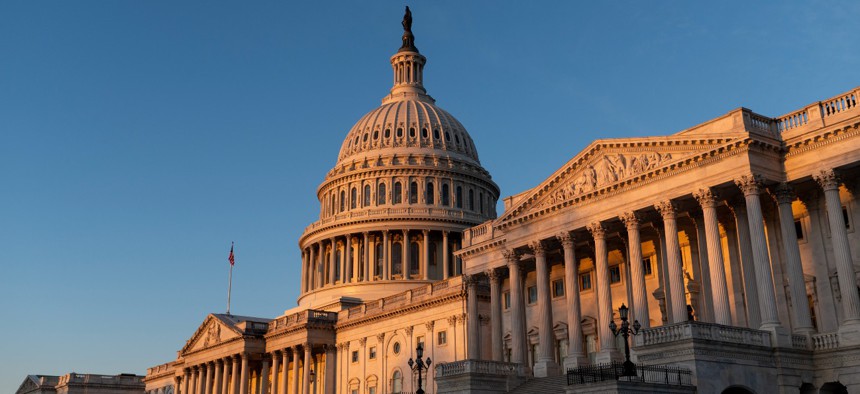
Congress is once again having trouble coming to agreement on spending levels, and time is running short to avoid a CR. Bill Clark/CQ-Roll Call, Inc via Getty Images
Agencies Are Struggling to Hire and Spend Money Due to Incessant Stopgap Funding Bills
GAO issues a warning as Congress struggles to reach fiscal 2023 spending agreement.
With lawmakers already cautioning of the potential need for a stopgap funding bill to avoid a shutdown in October, the government’s top watchdog has issued a warning of its own on the damage caused by those short-term measures.
Continuing resolutions, the temporary spending bills Congress has passed in all but three of the last 46 years, have wide-ranging impacts on agency operations, including their ability to bring in new employees. Agencies often limit or pause entirely hiring while CRs are in effect, as they have been in 47 different instances since 2010.
The Government Accountability Office based its findings primarily on discussions with three program offices across government. Officials at the departments of Agriculture, Education, and Health and Human Services said CRs led to "administrative inefficiencies and limited management options," including preparations they must take for a potential shutdown, reduced travel funds and a diminished ability to plan at all. They also noted the process hurts their hiring capacities, as some agencies do not extend new hire offers during a CR. That can hinder strategic plans and delivery of services, officials said.
Agencies reported an inability to finalize contracts and grant awards. Education's Predominantly Black Institutions program, for example, delays its award notices during CRs, which in turn causes recipient schools to postpone decisions about how to spend potential funds. At HHS' Low Income Home Energy Assistance Program, CRs cause disruptions for grantees providing assistance at different rates throughout the year due to seasonal changes. The stopgap bills cause administrative burdens for agencies, such as having to regularly update their allocation formulas to adjust for amounts doled out in the various spending measures. Agencies and grantees also said they have to take special efforts to get money out the door in a more concentrated timeframe when Congress only provides full-year appropriations late into the year.
Despite those obstacles, GAO found the agencies continued to provide services without major disruptions. Officials said they relied on previous experience with CRs and how to prioritize resources, including a familiarity among program office staff with adjusting allocations throughout the year. They have also offset potential disruptions by using authorities to repurpose funding that Congress originally provided for another purpose.
Lawmakers can also provide “anomalies” as part of CRs, as they have done in 690 instances since 2010. Those provisions give agencies a different, specific amount of money than they would normally receive or extend authorities otherwise set to expire. Requests for those anomalies come from the Office of Management and Budget, which typically asks agencies to send over their potential needs in early July of each year. In recent years, lawmakers have included around a dozen anomalies in each CR. In rare instances, agencies can receive multi-year appropriations that also offset the impact of stopgap funding bills.
Democrats and Republicans remain significantly divided as they approach the expiration of current funding. Democrats in the House and Senate have put forward separate bills for each of the 12 annual measures Congress must pass each year, doing so without any Republican support. The two sides have yet to agree on top-line funding levels for defense and non-defense spending, or the specific allocations for the 12 bills. Sen. Richard Shelby, R-Ala., the top Republican on the Senate Appropriations Committee, denounced the Democratic bills, saying they marked a step backward toward a possible resolution. He criticized Democrats for including “poison pill” provisions and for failing to include a sufficient increase for military spending.
“Democrats know the path to a successful appropriations process, but today they chose to move in a different direction,” Shelby said. “Today’s effort shows we have a long way to go. Democrats need to get serious or, regrettably, I believe we will end up with a long-term CR.”
Sen. Patrick Leahy, D-Vt., who chairs the committee, said historically high rates of inflation would make a long-term continuing resolution to keep agencies funded at their current levels “untenable” and called on Republicans to resume negotiations “with the urgency that this moment requires.”







